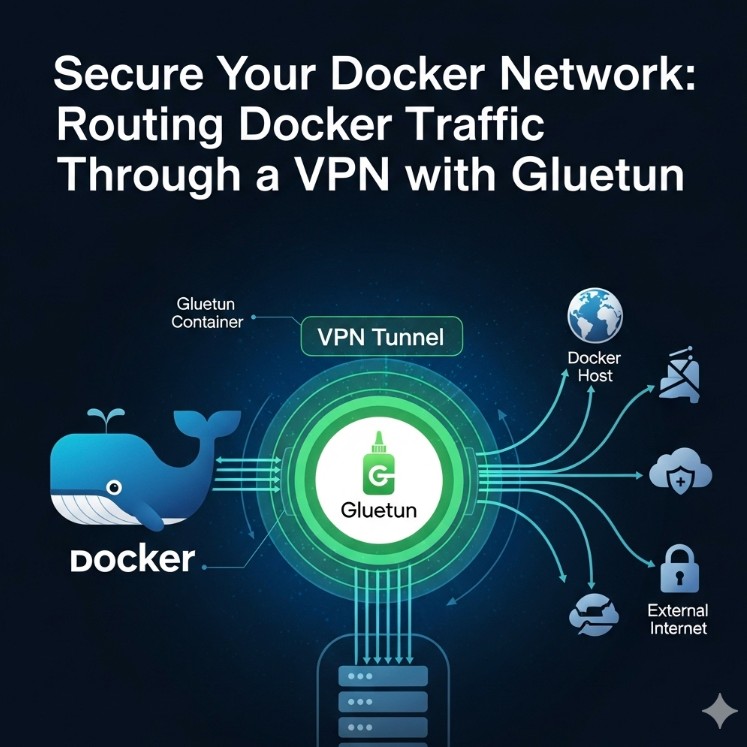Securing your Docker containers is paramount, especially when dealing with sensitive data or accessing external resources. One effective method is routing all Docker traffic through a VPN. This ensures that your network activity remains encrypted and private, protecting your applications and data from potential threats. This guide will demonstrate how to achieve this level of security using Docker VPN Gluetun, a powerful and versatile VPN client.
Table of Contents
- 1 Understanding the Need for Docker VPN Integration
- 2 Setting up Gluetun for Docker Network Management
- 3 Route Docker Traffic Through a VPN: The Docker VPN Gluetun Implementation
- 4 Troubleshooting Common Issues with Docker VPN Gluetun
- 5 Docker VPN Gluetun: Best Practices and Security Considerations
- 6 Frequently Asked Questions
- 7 Conclusion
Understanding the Need for Docker VPN Integration
Docker containers, while highly efficient, inherit the network configuration of the host machine. If your host lacks VPN protection, your Docker containers are equally vulnerable. Malicious actors could intercept network traffic, potentially stealing data or compromising your applications. By routing Docker traffic through a VPN using a tool like Gluetun, you create a secure, encrypted tunnel for all communication originating from your containers.
Setting up Gluetun for Docker Network Management
Gluetun is a robust, open-source VPN client that supports various VPN providers. Its flexibility and command-line interface make it ideal for integrating with Docker. Before we proceed, ensure you have Docker installed and running on your system. You’ll also need a Gluetun installation and a valid VPN subscription. Refer to the official Gluetun documentation here for detailed installation instructions.
Installing and Configuring Gluetun
- Installation: Follow the appropriate installation guide for your operating system as detailed in the Gluetun GitHub repository.
- Configuration: Configure Gluetun to connect to your VPN provider. This typically involves creating a configuration file (usually in YAML format) specifying your provider’s details, including server addresses, usernames, and passwords. Securely store your configuration files; avoid hardcoding sensitive information directly in scripts.
- Testing the Connection: After configuration, test the Gluetun connection to ensure it establishes a successful VPN tunnel. Verify the VPN connection using tools like
curl ifconfig.mewhich should show your VPN IP address.
Route Docker Traffic Through a VPN: The Docker VPN Gluetun Implementation
This section details how to effectively leverage Docker VPN Gluetun to route all your container’s traffic through the established VPN connection. This requires careful network configuration within Docker and Gluetun.
Creating a Custom Network
We’ll create a custom Docker network that uses Gluetun’s VPN interface as its gateway. This ensures all traffic from containers on this network is routed through the VPN.
docker network create --subnet=10.8.0.0/24 --gateway=$(ip route get 1.1.1.1 | awk '{print $NF;exit}') gluetun-network
Replace 1.1.1.1 with the IP address of a public server (like Cloudflare’s 1.1.1.1) to automatically detect your VPN gateway IP address. Adjust the subnet (10.8.0.0/24) if necessary to avoid conflicts with your existing networks.
Running Docker Containers on the VPN Network
When launching your Docker containers, specify the gluetun-network as the network to connect them to the VPN. This ensures all traffic generated within the container is routed through Gluetun’s VPN connection.
docker run --net=gluetun-network -d [your_docker_image]
Advanced Configuration: Using Docker Compose
For more complex deployments involving multiple containers, utilize Docker Compose for streamlined management. The docker-compose.yml file can define the custom network and assign containers to it.
version: "3.9"
services:
web:
image: nginx:latest
networks:
- gluetun-network
networks:
gluetun-network:
external: true
Remember to create the gluetun-network as described earlier before using this docker-compose.yml.
Troubleshooting Common Issues with Docker VPN Gluetun
While Gluetun is reliable, you might encounter some issues. Understanding these common problems can save time and frustration.
- Network Connectivity Problems: Ensure your Gluetun configuration is correct and the VPN connection is active. Verify the Gluetun logs for any errors.
- DNS Resolution Issues: Gluetun might not automatically resolve DNS through the VPN. You might need to configure your Docker containers to use the VPN’s DNS server.
- Port Forwarding: If you need to expose specific ports from your containers, ensure that port forwarding is correctly configured within Gluetun and your VPN provider.
Docker VPN Gluetun: Best Practices and Security Considerations
Implementing Docker VPN Gluetun enhances your Docker security significantly, but it’s essential to follow best practices for optimal protection.
- Strong Passwords and Authentication: Use strong, unique passwords for your VPN account and Docker containers. Implement multi-factor authentication wherever possible.
- Regular Updates: Keep Gluetun and your Docker images up-to-date to benefit from security patches and performance improvements. Utilize automated update mechanisms where feasible.
- Security Audits: Periodically review your Docker configuration and Gluetun settings to identify and address any potential vulnerabilities.
Frequently Asked Questions
Here are some frequently asked questions regarding routing Docker traffic through a VPN with Gluetun.
Q1: Can I use Gluetun with other VPN providers?
A1: Yes, Gluetun supports a variety of VPN providers. Check the Gluetun documentation for a list of supported providers and instructions on configuring each.
Q2: How do I monitor my VPN connection’s health?
A2: You can monitor the health of your VPN connection by checking the Gluetun logs, using the `gluetun status` command, or monitoring network metrics. Tools like `ip route` can show your routing table and indicate whether traffic is routed through the VPN.
Q3: What happens if my VPN connection drops?
A3: If your VPN connection drops, your Docker containers’ traffic will no longer be encrypted. Gluetun generally provides options for handling connection drops, such as automatically reconnecting, or you can configure Docker to halt container operations when the VPN is unavailable.
Q4: Is using Gluetun with Docker more secure than not using a VPN?
A4: Significantly, yes. Using a VPN like Gluetun with Docker provides a much higher level of security by encrypting all network traffic from your containers, protecting your data and application integrity.

Conclusion
Successfully integrating Docker VPN Gluetun provides a robust solution for securing your Docker environment. By carefully configuring your networks and adhering to best practices, you can protect your valuable data and applications from various online threats. Remember to regularly monitor your VPN connection and update your software for optimal security. Proper implementation of Docker VPN Gluetun represents a vital step in maintaining a secure and reliable Docker infrastructure. Thank you for reading the DevopsRoles page!
